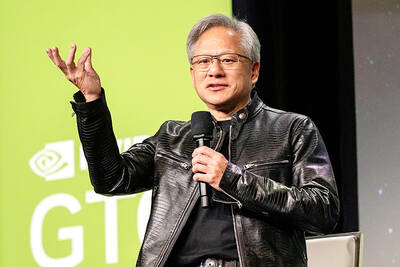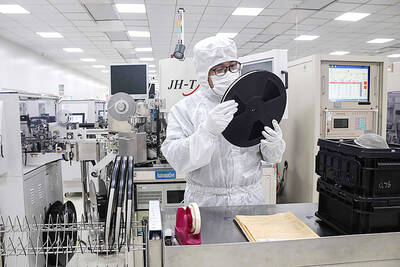Hong Kong Disneyland Resort (HKDL) yesterday said that its revenue last year jumped 31 percent as the number of domestic visitors to its attractions hit a record, helping the company shrug off the effects of COVID-19 pandemic-related restrictions.
Revenue for the 52-week year ended on Oct. 1 last year grew to HK$2.2 billion (US$280.7 million), with the net loss narrowing to HK$2.1 billion from a HK$2.4 billion loss a year earlier, HKDL said in a statement.
Total attendance reached 3.4 million, most from local tourists during the pandemic.

Photo: Bloomberg
In fiscal 2022, HKDL’s theme park only operated for about six months in total due to mandatory closures and weeks when it could only operate five days out of seven.
HKDL said the theme park would review market conditions and adjust its operations to open six or seven days a week from the middle of next month to meet demand.
HKDL is to reopen Disney’s Hollywood Hotel in mid-July, unveil the Walt Disney and Mickey Mouse statue “Dream Makers” in October and open its “World of Frozen” in November, it added.
Hong Kong’s economy has waged a comeback after emerging from a recession in the first quarter of this year — its first three-month period of growth in more than a year.
GDP expanded by 2.7 percent year-on-year, vastly exceeding expectations among economists and marking a rebound from a 4.1 percent decline in the final quarter of last year, the Hong Kong government reported on May 2.
An influx of tourists has boosted demand. Visitor arrivals surged to about 2.5 million in March, up 68 percent from February.
Additional reporting by Bloomberg

‘DECENT RESULTS’: The company said it is confident thanks to an improving world economy and uptakes in new wireless and AI technologies, despite US uncertainty Pegatron Corp (和碩) yesterday said it plans to build a new server manufacturing factory in the US this year to address US President Donald Trump’s new tariff policy. That would be the second server production base for Pegatron in addition to the existing facilities in Taoyuan, the iPhone assembler said. Servers are one of the new businesses Pegatron has explored in recent years to develop a more balanced product lineup. “We aim to provide our services from a location in the vicinity of our customers,” Pegatron president and chief executive officer Gary Cheng (鄭光治) told an online earnings conference yesterday. “We

It was late morning and steam was rising from water tanks atop the colorful, but opaque-windowed, “soapland” sex parlors in a historic Tokyo red-light district. Walking through the narrow streets, camera in hand, was Beniko — a former sex worker who is trying to capture the spirit of the area once known as Yoshiwara through photography. “People often talk about this neighborhood having a ‘bad history,’” said Beniko, who goes by her nickname. “But the truth is that through the years people have lived here, made a life here, sometimes struggled to survive. I want to share that reality.” In its mid-17th to

‘MAKE OR BREAK’: Nvidia shares remain down more than 9 percent, but investors are hoping CEO Jensen Huang’s speech can stave off fears that the sales boom is peaking Shares in Nvidia Corp’s Taiwanese suppliers mostly closed higher yesterday on hopes that the US artificial intelligence (AI) chip designer would showcase next-generation technologies at its annual AI conference slated to open later in the day. The GPU Technology Conference (GTC) in California is to feature developers, engineers, researchers, inventors and information technology professionals, and would focus on AI, computer graphics, data science, machine learning and autonomous machines. The event comes at a make-or-break moment for the firm, as it heads into the next few quarters, with Nvidia CEO Jensen Huang’s (黃仁勳) keynote speech today seen as having the ability to

The battle for artificial intelligence supremacy hinges on microchips, but the semiconductor sector that produces them has a dirty secret: It is a major source of chemicals linked to cancer and other health problems. Global chip sales surged more than 19 percent to about US$628 billion last year, according to the Semiconductor Industry Association, which forecasts double-digit growth again this year. That is adding urgency to reducing the effects of “forever chemicals” — which are also used to make firefighting foam, nonstick pans, raincoats and other everyday items — as are regulators in the US and Europe who are beginning to